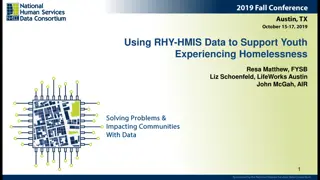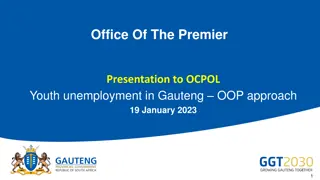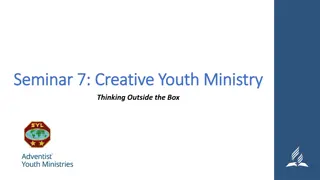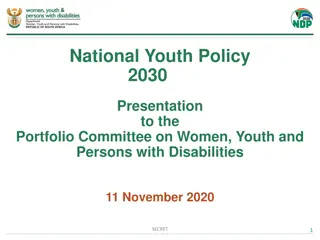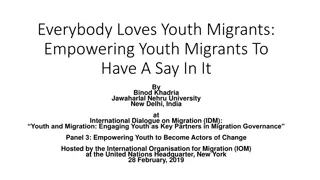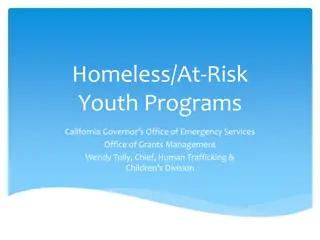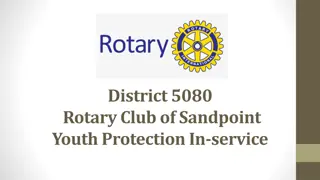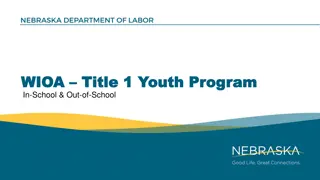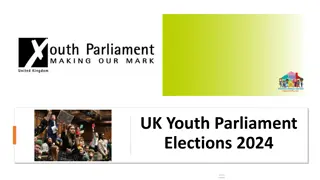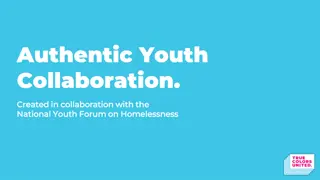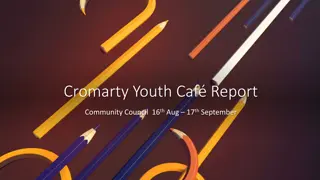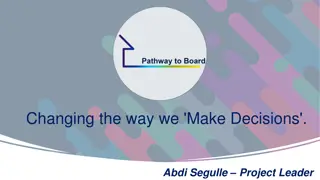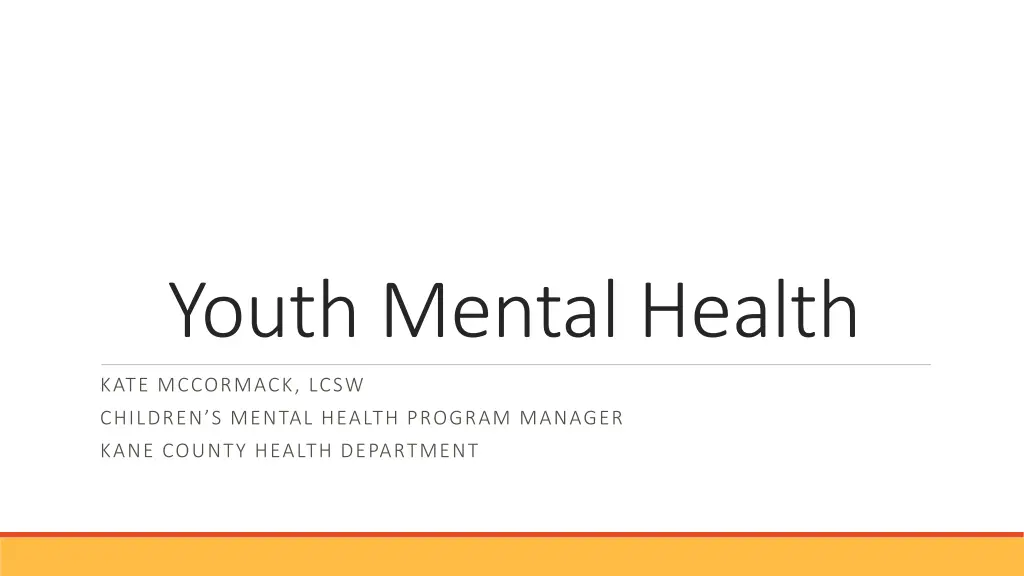
Understanding Youth Mental Health Initiatives in Kane County
Learn about the Kane County System of Care (KCSOC), a program aimed at improving youth mental health services through grants, parent involvement, and professional training. Discover the key initiatives and how schools and communities can support mental health awareness and treatment for children and adolescents in Kane County.
Download Presentation

Please find below an Image/Link to download the presentation.
The content on the website is provided AS IS for your information and personal use only. It may not be sold, licensed, or shared on other websites without obtaining consent from the author. If you encounter any issues during the download, it is possible that the publisher has removed the file from their server.
You are allowed to download the files provided on this website for personal or commercial use, subject to the condition that they are used lawfully. All files are the property of their respective owners.
The content on the website is provided AS IS for your information and personal use only. It may not be sold, licensed, or shared on other websites without obtaining consent from the author.
E N D
Presentation Transcript
Youth Mental Health KATE MCCORMACK, LCSW CHILDREN S MENTAL HEALTH PROGRAM MANAGER KANE COUNTY HEALTH DEPARTMENT
Kane County System of Care (KCSOC) *Kane County System of Care (KCSOC) the Children s Mental Health Grant *Received 7 year, 2 million dollar grant in 2018 from the IL Children s Healthcare Foundation *Grant does not provide direct services but rather focuses on creating connections between the institutions and organizations providing youth mental health services *Implementation team with representatives from the majority of the safety net behavioral health providers providing services in Kane County and the Kane County Regional Office of Education *Key deliverables of the grant include: raising youth and family voice in the system of care for mental health improving access to services providing culturally appropriate services increasing use of evidence based practices
Kane County System of Care Initiatives *Implementation Team -- formalizing communication and coordination across agencies and connecting them with parent leaders *Kane County Parent Council/Concilio de Padres bringing parent voices to the table, lifting the voices of parent leaders *Parent Caf Support Network/Red de los cafes para padres bilingual pilot program to address unmet need of evidence informed peer support and drop in parent support *Training Series for Community Mental Health Professionals strengthening therapeutic skills and promoting evidenced based practice among area providers *Strategic use of funding to support work of behavioral health providers and schools via school mental health mini grants, system of care grants, etc. *IRIS coordinated referral and data system
What Schools & Communities Should Know What Schools & Communities Should Know On any given day, in Kane County schools and communities, there are significant numbers of children and adolescents who are experiencing symptoms of a mental health disorder, developmental difference, or learning disability for which they are not receiving treatment. This creates stress for the young person, their teachers, their families, and classmates. Undiagnosed mental health disorders, developmental differences, or learning disabilities for some young people will lead to acting out behaviors and other health risk behaviors and if not treated can eventually lead to mental health or behavioral crises. The majority of mental health and substance abuse issues begin before the age of 18.
Why are more youth experiencing mental health issues and crisis? Wellness Crisis Need for services COVID-19 pandemic increased and intensified needs While decreasing capacity Availability of Services
Why did COVID-19 pandemic increase need for youth mental health services? *Increases in domestic violence and trauma exposure (increase in ACES across population) *Loss of traditional supports and increases in social isolation *Increases in stress on caregivers *Increases in stress on institutions providing supports transfer of resources to meet crisis needs instead of on more traditional services (hospitals, schools, health departments) *Loss of key developmental learning at key times in growth *When environments are stressful/hostile then those with a predisposition to certain mental health or developmental disorders are more likely to have them develop/express increasing their prevalence across the population
Youth Voices Forum 2021 Three key needs identified by the students More spaces to discuss mental health without judgement Increased access to accurate mental health information Increased access to adults who can provide accurate mental health information and provide authentic support
Youth Voices Forum 2022 Four key themes identified by the students Need for recognition and validation from adults in their lives that they are still being affected by the COVID-19 pandemic and the many challenges, changes, and losses they endured Need for improved access to formal and informal mental health services, professionals, and accurate information Mental health stigma is still prevalent and negatively impacts help seeking behavior Their generation is facing unique challenges due to their complex relationship with technology which was exacerbated by the COVID-19 pandemic
Youth Voices Forum 2023 Traumatized kids do not think people will believe or understand. Scared to scare for fear that you could lose your family or get taken away. Student, YVF, 2023 Preliminary Themes: -need more mental health services but also more compassion from all adults in their lives -need more time with mental health professionals to develop connection especially psychiatrists and school social workers -access to better trained and more diverse mental health work force if initial experience is of help seeking is negative will not seek help again
During the pandemic felt like I was suffocated by my family and I missed my friends a lot. -Student on the pandemic, Youth Voices Forum on Mental Health 2023
Threw a flaming ball into my mental health. -Student on virtual learning and little human interaction, Youth Voices Forum on Mental Health 2023
Youth Voices Forum and Reports Provide valuable information and insight to assist youth serving institutions with their program development and grant writing; Assist schools and youth serving organizations think more deeply about how they are incorporating youth voices; Assist in decision making regarding how to direct resources to improve youth mental health. Kane County Health Department (KCHD) staff are available to provide consultation to schools and organizations looking to begin the work of assessing the strengths and challenges in their current processes for promoting youth mental health. KCHD staff can assist with system and resource mapping, data collection, survey development, and creating spaces for intra-agency collaboration. Contact Kate McCormack to schedule or with questions: mccormackkatherine@co.kane.il.us
Action Steps to Consider: Action Steps to Consider: School Board Members, County Board members, Mayors, School Board Members, County Board members, Mayors, Township Supervisors, Sheriffs, Police Chiefs Township Supervisors, Sheriffs, Police Chiefs- - 1. Invest in Mental Health and Prevention Advocate for increasing reimbursement rates for Mental Health Services (Federal and State level) Provide supplemental funding for safety net social service and behavioral health agencies Support closing policy loopholes that have prevented parity for mental health services from being implemented fully Invest in high quality daycare and preschool (prevention) Invest in high quality after school and summer programming (prevention) Invest in Education (prevention) Invest in violence prevention programming Invest in public health education campaigns and education about identifying disinformation on the internet Expand mental health screening and intensive services for juvenile justice involved youth and their families
Action Steps to Consider: Action Steps to Consider: School Board Members, County Board members, Mayors, School Board Members, County Board members, Mayors, Township Supervisors, Sheriffs, Police Chiefs Township Supervisors, Sheriffs, Police Chiefs- - 2. Invest in the Mental Health Workforce Pay professionals in these fields adequately and find ways to keep them in the field Recruit mental health professionals particularly child psychiatric providers and psychologists trained in testing to provide services in the community Develop local experts within existing institutions instead of outsourcing vital functions to expensive contractors with incentives to sell a particular model Programs to keep professionals in the field: loan forgiveness, pay for trainings, childcare support Support the mental health of front line workers: police, firefighters, paramedics
Action Steps to Consider: Action Steps to Consider: School Board Members, County Board members, Mayors, School Board Members, County Board members, Mayors, Township Supervisors, Sheriffs, Police Chiefs Township Supervisors, Sheriffs, Police Chiefs- - 3. Invest in Health Navigators, Community Health Workers, and Case Managers Invest in health navigators and case managers who help enroll and keep people in enrolled in health insurance programming so they can access services Invest in community health workers and train them in screening and referring for mental health distress and disorders Establish SAIL office in the community to assist parents of children with disabilities in accessing social security disability funds
Action Steps to Consider: Action Steps to Consider: School Board Members, County Board members, Mayors, School Board Members, County Board members, Mayors, Township Supervisors, Sheriffs, Police Chiefs Township Supervisors, Sheriffs, Police Chiefs- - 4. Actively Seek & Support Additional Funding Sources to Support Mental Health Support 708 boards and promote coordination across 708 boards Hire staff to navigate and leverage complicated funding streams Apply for CDC and SAMSHA grants, etc. to support mental health programming Cultivate local experts rather than relying on national consultants 5. Facilitate Community Collaborations to Support Mental Health Encourage local data collection & data sharing on the way mental health impacts local communities: homelessness, violence, child abuse, substance abuse related accidents. Incentivize collection and dissemination of mental health related data from police departments, emergency rooms, schools, and behavioral health care providers Invest in researchers to investigate local challenges and identify best practice programming to address local challenges
Largest Safety Net Mental Health Providers for Largest Safety Net Mental Health Providers for Children and Youth in Kane County Children and Youth in Kane County All provide mental health services for youth through a variety of programs. All accept Medicaid and sliding scale payments based on income. See websites for details. AID (Aurora) https://www.aidcares.org/ Ecker Center (Elgin) https://www.eckercenter.org/ Family Service Association of Greater Elgin https://fsaelgin.org/index.php Family Counseling Services (Aurora) https://aurorafcs.org/ TriCity Family Services (Geneva) https://www.tricityfamilyservices.org/
Service Updates: Family Service Association of Greater Elgin (FSA) Reduced waitlist for outpatient therapy. Psychiatry appointments available for medication management. 988 Mental Health Crisis line is available. Crisis workers are ready to respond. Walk In Hours available for those seeking immediate assistance: Gail Borden Library 2ndand 4thSaturday 11am-3pm See flier for additional hours
Service Updates: Family Service Association of Greater Elgin (FSA), cont. Mental Health Juvenile Justice Program has immediate openings. School based program and Truancy program have openings in participating D300 schools: Dundee Crown High School Jacobs High School Carpentersville Middle School Dundee Middle School Lakewood School Golfview Elementary School
Service Updates: TriCity Family Services Wilderness Challenge Program currently has openings - Week long therapeutic canoeing and camping for youth going into 9th, 10th, 11th grades Family-Based Treatment for Eating Disorders currently has openings
Service Updates: Family Counseling Services (FCS) FCS and West Aurora School District 129 are continuing their partnership to offer school based therapy services at schools within the district. Project IMPACT is a new partnership this school year with D129 and FCS in which Family Counseling Service has Restorative practice coaches onsite at schools within the district to provide restorative practice services for students and staff. Virtual Parent Coaching group Thursday evenings from 7 to 8 p.m. open to the community. Contact FCS for details and costs.
Service Updates: AID Psychiatric appointments available for medication management. Street Outreach Program Supports individuals experiencing homelessness by encouraging engagement with appropriate mental health services. The goal of this program is to reduce inappropriate use of emergency services and support individuals with mental health needs.
Service Updates: Ecker Center Shorter wait lists for outpatient therapy and psychiatry services for both youth and adults even those without insurance. Substance abuse and early intervention services for adolescents.
West Aurora High School Updates (WAHS) WAHS Wellness Center transformed a basic conference room into a relaxing space for students to use during study halls (Tues.-Thurs.) and for staff to use during their plan period (Mondays). WAHS Community Wellness Team, comprised of staff and students, helped collaborate in the planning of the Wellness Center and the College, Career & Wellness Fair. Morning Moments every Wednesday morning, student-led announcements promoting positive/motivational messages/coping strategies. Mentoring programs Project Impact (staff-to-student) and Peer Impact (student-to-student, pairing LINK leaders w/9th graders) Social-emotional/support groups offered include Coping Skills, Emotional Regulation, Healthy Relationships, Grief, LGBTQ, BIPOC, De-stress, Teen Parenting and Alateen.
West Aurora High School Updates (WAHS), cont. WAHS Social workers and Psychologists, along with our LINK Leaders, present SEL lessons in 9thgrade study halls ( Connectedness is Key , Stress and Time Management , Mindset and Motivation , etc.). Substance Use/Abuse Prevention efforts ramped up this year with a Communication Campaign facilitated by Mutual Ground Substance Use Services. Also beginning a similar campaign about the dangers of vaping (the Vape Free School Initiative), with a grant received from KCHD this month. Substance Use/Abuse Intervention efforts involve a Drug Diversion program, where drug education is offered to students in lieu of out of school suspension when they are in violation of the drug use/possession policy. The second layer of the is program involves a partnership with Rosecrance for on-site assessments and treatment recommendations. District Restorative Practices team is made up of a team of restorative coaches trained to facilitate restorative conferences and provide formal and informal professional development to staff.





